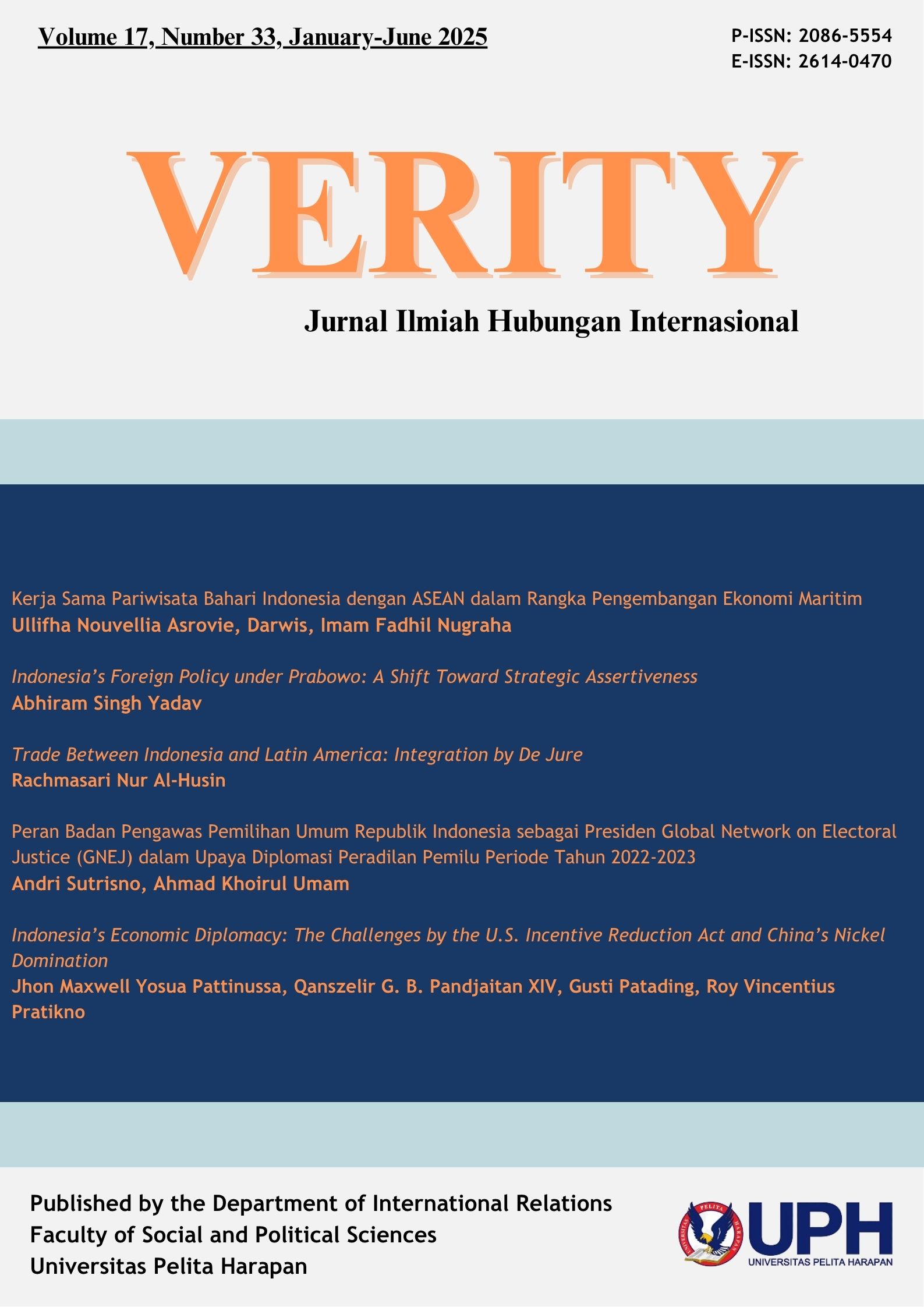Indonesia’s Foreign Policy under Prabowo: A Shift Toward Strategic Assertiveness
DOI:
https://doi.org/10.19166/verity.v17i33.9507Keywords:
foreign policy, democratic government , doctrine, strategic partnerships, diplomacyAbstract
Indonesia’s foreign policy has traditionally followed the Bebas dan Aktif (Free and Active) doctrine, emphasizing neutrality while actively engaging in global affairs. However, the election of Prabowo Subianto in 2024 marks a significant shift toward a more assertive and strategic approach. While maintaining Joko Widodo’s focus on economic diplomacy, Prabowo has expanded Indonesia’s priorities to include national security, defense, and global partnerships. His administration has actively pursued key initiatives such as joining BRICS, strengthening maritime security in the Indo-Pacific, and expanding military cooperation with major global powers. This study employs a qualitative thematic analysis of existing literature to examine these policy shifts and their implications for Indonesia’s position on the world stage. The findings indicate that while economic diplomacy remains a central pillar, Prabowo’s approach reflects a broader vision that integrates economic interests with national security and strategic alliances. His leadership emphasizes Indonesia’s sovereignty, defense modernization, and a stronger regional and global presence. By balancing economic partnerships with increased military engagement, Prabowo aims to position Indonesia as an influential middle power capable of shaping regional and international dynamics. Overall, this study highlights how Indonesia’s foreign policy under Prabowo represents a transition from economic pragmatism to a more comprehensive strategy that reinforces national interests while fostering strategic global collaborations.
References
Al Jazeera. (2025, January 7). Indonesia joins BRICS group of emerging economies. AlJazeera. https://www.aljazeera.com/news/2025/1/7/indonesia-joins-brics-group-of-emerging-economies
Anwar, D. (2024). The many facets of Prabowo Subianto: Quo vadis Indonesia's foreign policy? Asia Policy, 19(4), 108–116. https://doi.org/10.1353/asp.2024.a942837
Cahya, D., Mamahit, D., Widodo, P., Saragih, R., & Suwarno, P. (2023). Indonesia's role in realizing the vision of the ASEAN Economic Community (AEC) and the ASEAN Socio-Cultural Community (ASCC). International Journal of Humanities Education and Social Sciences (IJHESS), 2(6), 2187–2194.
Erbas, I. (2022). Constructivist approach in foreign policy and in international relations. Journal of Positive School Psychology, 6(3), 5087–5096.
Hourn, K. (2024). Steering through turbulent waters: Indonesia’s leadership in shaping ASEAN’s economic resilience. ASEAN Secretariat. https://asean.org/wp-content/uploads/2024/11/Op-Ed-Steering-Through-Turbulent-Waters-Indonesias-Leadership-in-Shaping-ASEANs-Economic-Resilience_FINAL.pdf
Negara, S. (2019). The Indonesian economy under Jokowi’s second term. ISEAS-Yusof Ishak Institute. https://www.iseas.edu.sg/wp-content/uploads/pdfs/ISEAS_Perspective_2019_42.pdf
Oranga, J., & Matere, A. (2023). Qualitative research: Essence, types and advantages. Open Access Library Journal, 10, 1–9. https://doi.org/10.4236/oalib.1111001
Peterson, D. (2024, October 21). Prabowo Subianto’s ‘hands-on’ foreign policy beckons. LSE Southeast Asia Blog. https://blogs.lse.ac.uk/seac/2024/10/21/prabowo-subiantos-hands-on-foreign-policy-beckons
Pradnyana, H. (2024, October 19). Indonesia’s foreign policy under Prabowo: A neorealist approach to geopolitical tensions. Modern Diplomacy. https://moderndiplomacy.eu/2024/10/19/indonesias-foreign-policy-under-prabowo-a-neorealist-approach-to-geopolitical-tensions
Qudsiati, A., & Sholeh, B. (n.d.). The role analysis of Indonesia's policy strategy on Indo-Pacific. Journal of Diplomacy and International Studies, 39–50.
Raditio, K. (2024). Prabowo’s core value: Shaping economic and foreign policy beyond binary choice. S. Rajaratnam School of International Studies. https://www.rsis.edu.sg/wp-content/uploads/2024/09/IP24074.pdf
Rosyidin, M., & Pattipeilohy, S. C. H. (2020). Regionalism under challenge: Ideas and Joko Widodo's foreign policy towards ASEAN, 2014–2019. Journal of ASEAN Studies, 8(2), 147–172. https://doi.org/10.21512/jas.v8i2.6596
Saha, R. (2024). Indonesian foreign policy is still free, more active. Lowy Institute. https://www.lowyinstitute.org/the-interpreter/indonesian-foreign-policy-still-free-more-active
Setiawan, A. (2024). An analysis of President Joko Widodo's economic diplomacy from 2014 to 2024: Results in foreign investment and global trade volume. Action Research Literate, 8(12), 3495–3500. https://doi.org/10.46799/arl.v8i12.2520
Simatupang, H., & Panggabean, M. (2022). The implementation of Indonesia’s free and active foreign policy over the Russia–Ukraine War during Indonesia’s G20 presidency. Advances in Social Science, Education and Humanities Research (ASSEHR), 2(1), 590–602. https://doi.org/10.2991/978-2-494069-65-7_49
Subianto, P. (2024). Prabowo Subianto and Gibran Rakabuming Raka's Asta Cita (English). https://prabowosubianto.com/asta-cita-2/
Syarip, R. (2020). Defending foreign policy at home: Indonesia and the ASEAN-based free trade agreements. Journal of Current Southeast Asian Affairs, 39(3), 405–427.
Wicaksana, I. (n.d.). The constructivist approach towards foreign policy analysis. https://citeseerx.ist.psu.edu/document?repid=rep1&type=pdf&doi=dcd0e82e5200e4ead76f88f1b7ed75256974e710
Wicaksana, I. G. W., & Karim, M. F. (2022). Approaches to Indonesia’s foreign policy: Area studies, FPA theory, and global IR. Journal of ASEAN Studies, 10(2), 161–180. https://doi.org/10.21512/jas.v10i2.9059
Downloads
Published
Issue
Section
License
Copyright (c) 2025 Abhiram Singh Yadav

This work is licensed under a Creative Commons Attribution-ShareAlike 4.0 International License.
Authors who publish with this journal agree to the following terms:
1) Authors retain copyright and grant the journal right of first publication with the work simultaneously licensed under a Creative Commons Attribution License (CC-BY-SA 4.0) that allows others to share the work with an acknowledgement of the work's authorship and initial publication in this journal.
2) Authors are able to enter into separate, additional contractual arrangements for the non-exclusive distribution of the journal's published version of the work (e.g., post it to an institutional repository or publish it in a book), with an acknowledgement of its initial publication in this journal.
3) Authors are permitted and encouraged to post their work online (e.g., in institutional repositories or on their website). The final published PDF should be used and bibliographic details that credit the publication in this journal should be included.


